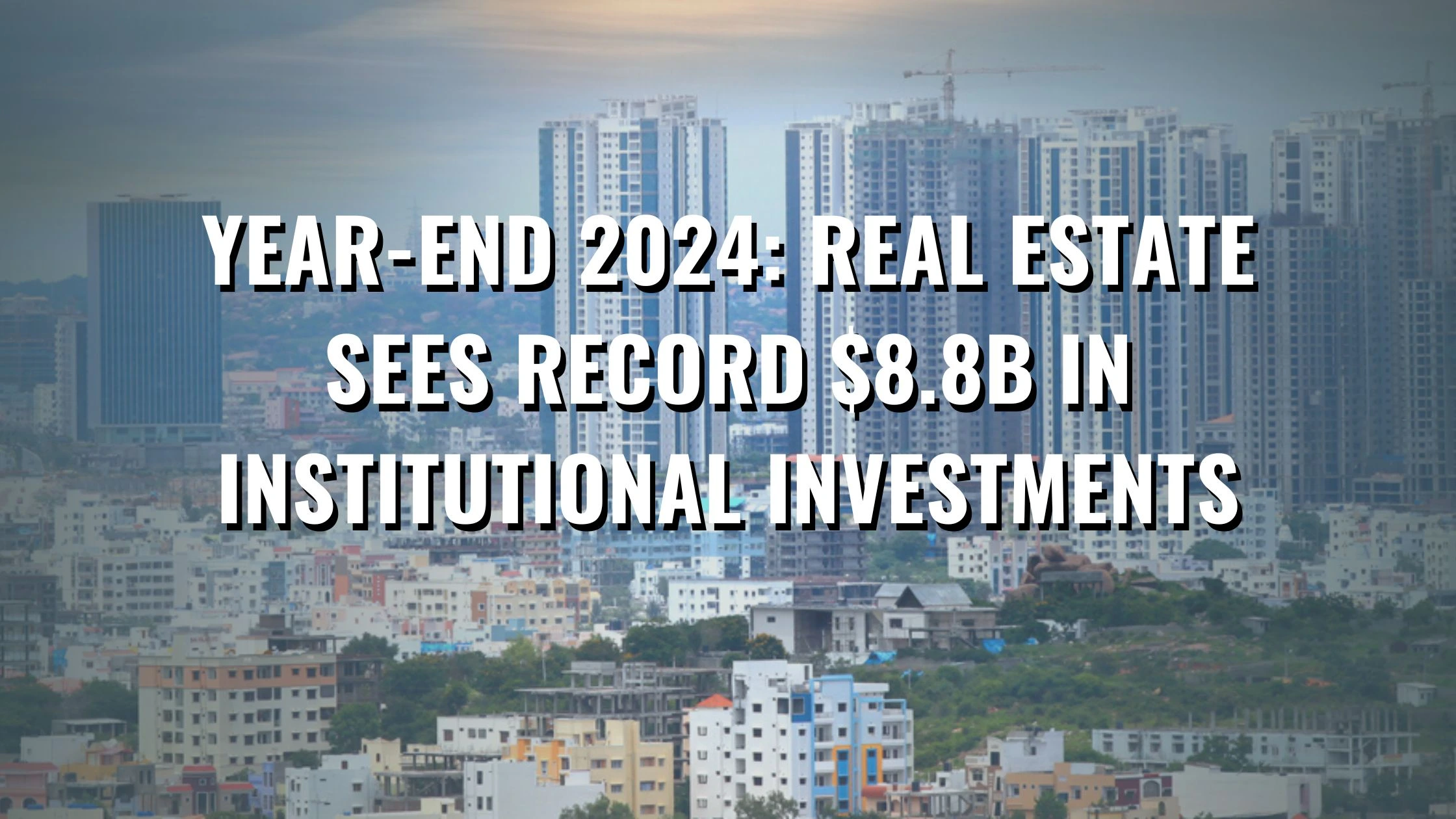Table of Content
▲
A record-breaking $8.8 billion was invested in the Indian real estate industry in 2024, marking an exceptional upsurge in institutional investments. Compared to 2023, when the total investment was $5.8 billion, this amount represents a 51% increase. This remarkable expansion is a direct result of the industry's excellent performance and rising investor confidence.
An Unprecedented Year in Indian Property
India's real estate industry achieved a major milestone in 2024 when it attracted the most institutional investments ever, breaking the previous record of $8.4 billion established in 2007. This outstanding accomplishment was the consequence of 78 transactions, which represented a 47% rise in transactions over the prior year. The surge in investments showcases the dynamic shift in India’s real estate landscape, which continues to evolve and attract both domestic and international investors.
Also Read: Purvanchal Expressway: Transforming Connectivity in Eastern Uttar Pradesh
The Rise of Residential Real Estate
Among various segments of the market, the residential sector became the largest, accounting for nearly 45% of total investment. This is a remarkable shift, given that traditionally the office sector has been a very important one for institutional investments in India. By 2024, nearly $4 billion had gushed into 49 deals in the residential segment, thus marking a staggering fourfold increase over the previous year. A major push came from domestic investors, demonstrating a greater interest in the residential segment.
Foreign investors, however, continued to show a preference for office and warehousing properties, while the domestic investors focused more on the residential market. The change indicates the shifting preference and a growing belief in the potential for high returns the residential sector offers. Moreover, of the total investments in the residential segment, over 50% came through QIPs, a funding route that has gained traction in recent times.
Office Sector Experiences a Downturn
While the residential sector boomed, the office sector faced a slowdown in investments with a decline of 17% as compared with 2023. Despite that, office products attracted a daunting $2.5 billion investment spread over 18 deals, of which 61% transactions were focused on core assets--properties with solid rental income plus long-term value. The decline in office investments might have reflected the changing market dynamics, where investors are looking for a better return for their investment now in residential and warehousing properties
A Shift in Investment Strategies
One of the most notable changes in 2024 was the shift in investment strategies within the residential sector. In 2023, structured debt was the preferred investment route, accounting for 92% of residential investment volumes. However, in 2024, equity contributions surged to 54% of the total investments. This marks a shift towards higher-risk, higher-reward investments, signaling a growing confidence in the residential sector’s ability to deliver capital appreciation and attractive returns.
The Dominance of Foreign Institutional Investors
In 2024, 63% of the total institutions’ investments headed towards the Indian real estate market. Perhaps, such an investment pattern is prevalent since India manages to attract foreign investment due to positive growth rates, stable politics, and business-friendly environment. However, it is also worth noting that there has been a noticeable shift towards domestic investing as they made up for 37% of the total investments in 2024 in comparison to an average of 19% from 2019 to 2022.
Due to this shift partially domestically, local investors appear to have more faith in India’s real estate market than before. Also, there was increased activity in Real Estate Investment Trusts (REITs), where investment in these instruments increased to almost $800 million in 2024, three times the amount recorded in 2023.
Looking Ahead: A Bright Future for Indian Real Estate
The outlook for IIndia’s real estate market is still foreseeing growth. QIPs will, in all likelihood, start playing a more essential role in the capital-raising process, particularly as more companies become public and look for financial support. Demand for housing, office spaces, and warehouse properties is strong and, hence, remains an attractive sector for investors, positioning India as one of the key players in the global real estate market worldwide.
2024 has proven to be a landmark year for Indian real estate. With record-breaking investments and shifting trends in investor behavior, the sector is poised for sustained growth. Whether it’s the rise of the residential sector, the resilience of office investments, or the growing role of domestic investors, India’s real estate market has firmly established itself as a powerhouse on the global stage.
Also Read: PMAY-U 2.0: Apply Online for Your Affordable Urban Home Now



_1771577585.webp)



Ans 1. Increased demand for residential properties, strong economic growth, and investor confidence in India’s political stability were key factors.
Ans 2. The residential sector led with 45% of the total institutional investments, followed by office buildings at 28%.
Ans 3. Domestic investors accounted for 37% of the total investments, reflecting a significant rise from previous years.
Ans 4. Qualified Institutional Placements (QIPs) emerged as a dominant funding route, contributing to more than half of the residential sector’s investments in 2024.
Ans 5. Office investments saw a 17% decline in 2024 but still attracted significant funding, particularly in core assets.
Ans 6. The Indian real estate sector is expected to continue its growth, driven by strong demand, political stability, and increasing participation from domestic investors.
Ans 7. Foreign institutional investors accounted for 63% of the total investments, showcasing India’s global appeal as an investment destination.
Ans 8. REITs saw a significant surge in activity, with investments reaching nearly $800 million, marking a more than three-fold increase from 2023.